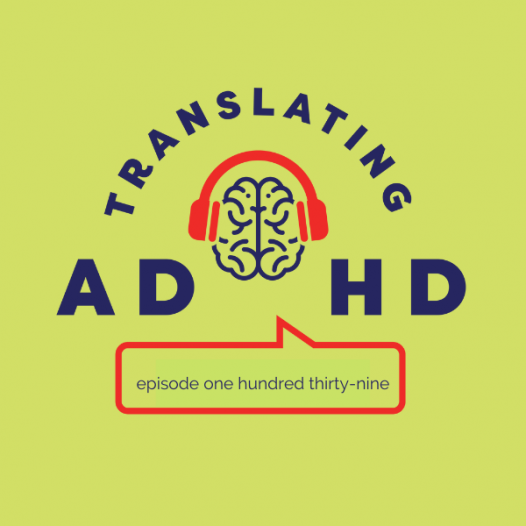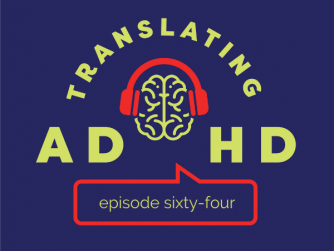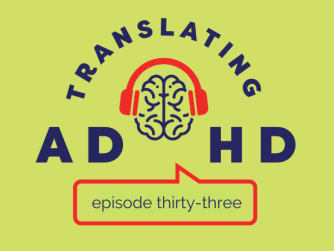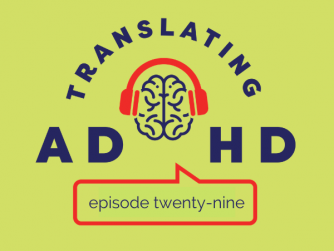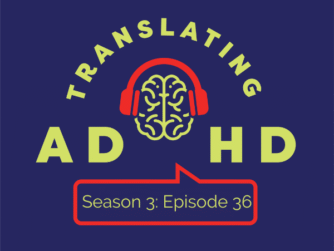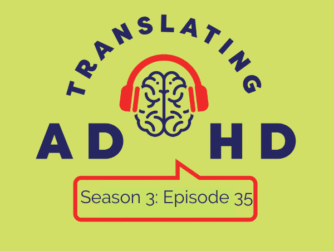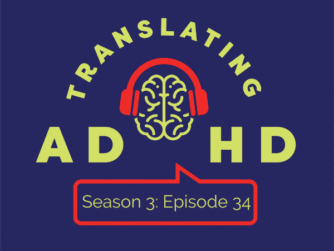Cam and Shelly kick off the third season of the Translating ADHD podcast entertaining an often-asked question in ADHD circles – Is ADHD a Superpower?
It turns out that one’s own experience or context informs how people will answer this question. Many are emphatic one way or the other – that it is totally a superpower! or that it is not at all a superpower! Shelly and Cam, in usual form, explore the nuanced middle ground and discuss superpowers in the form of strengths and how ADHD can get in the way of distinguishing, owning and stepping into one’s strengths. Shelly and Cam point to research that proves that one’s context such as race, gender and marital and economic status influence one’s outlook on their ADHD (links below). The hosts share a number of client examples and examples from their own lives to look at framing one’s ADHD experience by exploring concepts like personal preferences and identities. Most significant, the hosts introduce the theme for the start of Season 3 – Your own context matters.
Episode links + resources:
Flourishing Despite ADHD Article
Positive Aspects of ADHD Article
For more of the Translating ADHD podcast:
- Episode Transcripts: visit TranslatingADHD.com and click on the episode
- Follow us on Twitter: @TranslatingADHD
- Visit the Website: TranslatingADHD.com
Episode Transcript:
[00:00:00] Shelly: Hi, I’m Shelly. [00:00:01] Cam: And I’m Cam. [00:00:02] Shelly: And this is translating ADHD. We’re back from our summer break [00:00:08] Cam: We are back. Shelly and I are looking at each other, like what’s going [00:00:14] Shelly: How do we do this? It’s so funny that that seven weeks off, I feel so rusty cam, I gotta shake it off a little bit. [00:00:21] Cam: so be patient with us listeners as we ease back into, season three. [00:00:29] Shelly: Season three. Wow. We’ve been at this a while. [00:00:32] Cam: Well, what’s funny is it’s actually. I wanna say season three plus, because one of our seasons I think went almost two years [00:00:42] Shelly: It did until we decided that we needed a dang break. Right. [00:00:46] Cam: Right. [00:00:47] Shelly: So before we dive in quick announcement about group coaching, as of this recording, which you all won’t hear until next week, self-care does still have a couple of slots available that class begins Wednesday, September 28th. If by the time this episode comes out, the registration button is no longer there. Go ahead and shoot an email to the provided email address and inquire about being put on the wait list.Oftentimes we are able to work, wait, list people into our classes. It tends to work out the way that it’s supposed to. So if you happen to miss that registration window and you were interested in being in the class, definitely reach out and let us know. So cam. The theme of season three, or at least the start of season three context.
[00:01:39] Cam: Yeah. And specifically your context matters. And as Shelly and I were finishing up season two, it was just becoming super clear to us. Of the role of context and we’ve done episodes on context. You’ve heard us talk about context in a lot of different ways. We talk about how we’re wired for context, but as we finished up season two and we’re moving into season three, we were talking a little bit about the interplay of ADHD and other things.Just again, issues, challenges, comorbidities life experiences in that our clients have really rich and complex lives. The ADHD comes into play. It informs, it influences it, heightens it diminishes, and it distorts. And so this is why the Rainier model works so well in the sense of every person has a unique valley experience. So you can have someone being super sensitive and have a rejection, sensitivity experience. You can have someone on the other side of that model, where there was very little empathy for the world for others, and just unable to access that emotion. So context matters. And we’re gonna start with this really kicking off with this question that we see often I’ve seen it in 20 years.
I’ve seen it asked time and time again, and people really struggle with it and have strong opinions about it. And that question is, is ADHD a super power? So Shelly is ADHD is superpower.
[00:03:23] Shelly: Wow way to put me on the spot, Cam. [00:03:26] Cam: Let’s just go. We’re tossing you in the deep end. You know, just go ahead. Let’s start swimming. [00:03:31] Shelly: ha. Well, cam, I think that depends on an individual’s context, which is what we’re here to talk about today. [00:03:39] Cam: And I think that people, they want this sort of quick answer or they’re kind of drawn to. It absolutely this, right? It absolutely is this, it is a superpower or no, it’s not that often people with ADHD, we live at the polls, right. In the sense of the polar places of where the intensity is. Absolutely.Yes or absolutely. No. And Shelly and I are here to say, well, it depends. It depends on context and it depends on how you draw. The frame. So those are there are those of you out there who have this experience, and you’re just speaking back to us on your walk, listening to this podcast, like absolutely. It’s absolutely superpower and others who are saying absolutely not. It is anything but a superpower. And then there are those of you who are somewhere in the middle. And so, again, There is no definitive answer here. What Shelley and I wanna do is really start to dig into this whole concept of your context matters, why it can be a superpower and really what we do as coaches and Shelley.
I love what you were saying before. The episode that often our clients come and they’re in this place of this ADHD is kicking my ass and. I don’t see it as a superpower and I don’t see any strengths. So we don’t as coaches really talk about superpowers. What we talk about in our strength based coaching philosophy or process is to help clients identify strengths, to help them see the strengths that are there that are part of their identity.
[00:05:19] Shelly: I think it’s important to say, to help them see strength and also see challenge to see both. That’s my perspective on is ADHD a superpower or not. It’s a little bit of, Coine a little bit of column B. My clients have incredible strengths due to their uniquely wired brains, and it is so fun to help them discover those strengths.But ADHD presents a lot of unique challenges as well. And to downplay those and lean only into strength is a privilege that very few of us have.
[00:05:59] Cam: Right. And before the break, we talked a little bit about a couple studies that were out about flourishing with ADHD. And I had shared that. Yeah, there’s certain, if you check certain boxes, one study had that. If you were a male, if you had some kind of spiritual practice, if you were married and you had some kind of exercise regimen, That did very well with. You likely call it or think of it in positive terms? That study also revealed what is not present like trauma, physical pain. [00:06:38] Shelly: economic status, relationship status. Gender is a huge one that stood out to me there. The gender dynamics that still play out in Western society, in a marriage, my men who are married to neurotypical partners. Generally have a pretty different experience than my women who are married to neurotypical partners. [00:07:06] Cam: Right Race two. Why we highlight people of color and our POC voices, Talking about how coaches of color are reaching out and making headway in communities of color and bringing mental health, front, and center. lots of different things that come into play.There was another study. Very. . But again, it was individuals who were male, high energy, and again, having someone there to support all the logistical stuff, personal and professional. So your experience may be that it’s a superpower. There are those of us out there. Who, again, as Shelly was saying, there are strengths associated with it.
There are also challenges. And what we do with our clients is to help them distinguish and figure out what the challenges are, but also accentuate the strengths. A couple things can happen. One thing is, is that there’s this thinking. Number one, I’ve gotta answer this question of, is it a superpower or not before I can proceed?
Or what is ADHD? What exactly is it? Where is the edge? And that’s really hard too, but it has people kind of delaying or hesitating getting into action. The other one, Shelly is this is I’ve got to mitigate all my challenges. Before I can step into any kind of strength work. Right? That’s whack-a-mole, that’s a whack-a-mole approach that you will never right.
How you doing out there? Folks? Have you mitigated all those challenges?
[00:08:51] Shelly: I haven’t [00:08:52] Cam: Yeah me, me. Me? Yeah, I’ll be, I’ll go up and ask my, uh, my lovely spouse. right. So it’s being able to. Again, entertain this and locate those strengths and start to spend more time in those strength areas and yes, address the challenges as they come. [00:09:14] Shelly: cam I think it would be helpful to bring a client example in here to illustrate what we’re talking about. I had a client who was a career coach. And when we first started working together, she really had fallen out of love with her business. And she was considering moving into something else. The more we dug into what wasn’t working in her business. The more, we found a lot of shoulds. I should be doing resume writing everyone in my field offers resume writing. Therefore, it’s something I have to offer. I should be operating this way. This is how everyone else does it. So here’s the interesting thing.Is alongside those conversations, her unique strength and value started to really come out because not only were we talking about the type of work that she doesn’t like to do, we were also getting clear on what she really loves to do. she has this really unique approach of working with people to do what she calls, telling their career story. She’s brilliant at it. And it’s so fun for her, but here we were in this place where she couldn’t let go of the shoulds and she wasn’t seeing that unique strength and value for the asset that it was. So over time, we start to lean more into that, into that incredible asset. And guess what? She falls back in love with her business.
She lets go of the shoulds. She’s now able to activate for tasks around her business that she was really struggling to activate for. So had we tried the whackamole approach? Of let’s attend to what you’re not attending to first, let’s get those invoices out. Let’s get that resume written. Let’s get this list of backlog tasks taken care of.
We would’ve kept spinning our wheels in the mud because we wouldn’t have been addressing the elephant in the room, how she had crafted a business that was working against her strengths. And was playing to her challenges and cam I know that all too well. I’ve talked before about when I was a professional organizer, particularly those first couple of years, I thought that I had to present in a certain way.
I thought that I had to come off very type, a very organized. Everything in my business was an overly complicated process for a one woman business organizing homes and businesses, because I thought that’s what I was supposed to do. And those very same things built up walls of awful for me. But when I started letting go of that, When I started letting it be simple when I started hiring clients based on my strengths and how I like to work, rather than feeling like I had to work with any client who came through the door in whatever way they wanted me to work with them.
I really started to enjoy the work again, and that work opened the door to this work, this coaching work, because I was always working with my clients from the perspective of helping them organize in a way that works for them. And coaching is just a bigger snapshot of the same idea. It’s about helping people create a life that fits.
[00:12:47] Cam: Yeah, I love that. I love that story because it’s reminding me of my own experience. And I think that. again, I can bring in some perspective regarding how the ADHD comes into play here. And so when we’re stressed, when we’re feeling stressed and again, faced with shoulds and, and not being successful, we can kind of go to this default mode or approach and our ADHD just hitches a ride.One thing is it’s sort of like, along with that big idea generator is to think I gotta cast a wider net. Right? So back in the day when I was not getting clients or trying to figure out how to get coaching clients, it was like the thought was I gotta go bigger, broader being more of a generalist and in doing so I was not really defining my.
And this is like the pero principle. It’s that the 80 20 rule. So the 80 20 rule is this knowing what’s the 20% that’s gonna give 80% of. What’s the word I’m looking for. Shelly, I’m having word loss uh, return. 80% return on investment ROI. What is that? 20%? What’s the 20% where I focus. It’s gonna give me return on investment.
This is one of the most difficult things with ADHD. So hyper focus can, again, I think some of. superpower guys, dopamine, state, superpower guys, they find their hyperfocus area and they find that, that, narrow lane that they work on. And then they got all these people that are picking up the pieces and sometimes they’re aware of it sometimes they’re not, but I love what you said there about letting. it’s that sort of trusting that. Okay. what I wanna do is go wider, but your client and yourself is sort of like that. Letting go is being a choice and casting a narrower net, a smaller net. goes back to our work around roles and responsibilities. Right. Our episodes on defining roles. What is my role?
What is my responsibility with my clients? We always talk about swim lanes because we just wanna kind of amble and weave and, oh, there’s something exciting over there. And oh, that exciting thing happens to be well, either be a sighting or scary, right. Challenges are going to draw our attention more so than a strength.
That’s that big signal thing that we’ve talked about. So all kinds of interesting topics from past episodes that are coming into episode, and as we go forward into this whole theme of your context matters.
[00:15:37] Shelly: Cam, I wanna talk about another interesting way that my clients relate or don’t relate to the idea of ADHD as a superpower. So you talked about these two polar opposites, right? Or, you know, me, I like a pendulum, you know, the idea that there’s space between, so this place of. Victimhood of ADHD is absolutely not a superpower.It is a curse. It is a blight on by life. And then on the other side, the superpower perspective. But what we haven’t talked about is those clients who diminish their accomplishments because of ADHD, the client who got through grad school. And it was tough and there were some ADHD behaviors and there lots of them, lots of Allnighters lots of crunching deadlines, but they got their degree.
But to hear the client talk about it, it’s somehow not valid. They’re doing things at the last minute, invalidates that accomplishment in some way, their ability to bang out creative, good work quickly, albeit with some costs, right? This is adrenaline response cycle stuff here, but that ability to produce high quality creative work under pressure, it’s like that gets written off. It doesn’t count. I didn’t really do it cuz I didn’t do it the way everyone else did it. I wasn’t the good student.
[00:17:10] Cam: Ooh. [00:17:12] Shelly: Ah, interestingly enough this, this came up with a client just last week. She’s been through grad school. She is currently in a PhD program and also working full time. So her life circumstances are very different than grad school, where school was the dominant thing.And she wants to have a different experience here in this program than she had in grad school. That’s what we’re working on. So we’re looking at the semester and we’re talking about the first major assignment that’s due. And she says, I’ve tried to start papers earlier, but I just can’t get into the flow.
I just can’t write. There’s something about that pressure of a deadline. Makes the creativity. It just allows me to tap into creativity. The words just flow, they just flow. I said, okay, so what can we do? And here’s the first thing she says, well, I guess I should do an outline now, cam as a kid that always did the outline.
After I wrote the paper, when I had to turn in an outline I was highly suspect of that statement. And so I just asked. Is an outline helpful. And it turns out she too is the kid that would always do the outline after she wrote the paper. So, no, it’s not helpful. But what we did come to is what she could be doing rather than sitting down a blank document is a starting place.
She can figure out her topic, she can pull some research, she can get that bibliography done. So that she doesn’t have to spend the time doing it when she’s writing. And so rather than fighting against this state of flow, that allows her to write so freely and makes it so much easier for her. We’re working with it.
Let’s keep that. Let’s keep that part where you sit down and the words flow, but let’s do the pre-work in advance. So that when we get to that point, that one to three days before the paper is due, all you have to do is write, you don’t have to do a bibliography. You don’t have to find research. You don’t have to pull quotes.
That part is done. So one of those cases where we think the solution is to throw out the whole behavior. To throw out the whole behavior of waiting until the last minute to do things. When in this case it’s okay to wait. Let’s just modify how much work is at that point. If that’s, when you write best, let’s write then and do everything else first.
[00:19:50] Cam: This reminds me of this story you’ve told several times about how you prepare for talks and the kind of again, the should around, oh, I should get started versus I think one of the last times you did a talk on time was like, you know what, I’m just not gonna have this stress and anxiety about this thing. And I’m gonna go ahead and accept. This is about acceptance, people.Under that understand, own translate under own, is that acceptance of. my unconventional way is my way, and I can choose here how I have this experience, Of letting it be easy, letting it be the way it works for you. As you said with your client is working with versus working against often, I use a metaphor of, you know, this sort of this sense that our clients are paddling upstream, you know, paddling against the current. okay, how can we turn this boat around? How can we go with the current go with the ways you prefer to approach work? And so back to that, acknowledging the way you do it. And I love what you said earlier about how we invalidate our experiences because of its not the air quote way it’s supposed to be done.
I can’t tell you how many times I did that. That somehow, because I pulled it out right the last minute. Well, it doesn’t really count. And so then we lose ourselves in the picture. We don’t see ourselves as someone as capable and confident. here we are, again, not distinguishing strengths, owning those strengths and stepping into those strengths.
[00:21:39] Shelly: Cam, what we’re talking about here is what I tell every new coaching client in terms of where I want them to be. By the time we finish working together. And that’s this place of ownership. Ownership is not about embracing ADHD as a superpower. And it’s also not about accepting it as a curse that you have to live with and mitigate.It really is that wonderful place between where there’s room to tap into strength. And mitigate challenge and to do it your own way to do it in a way that works for you without guilt and shame. My client’s mind was blown when I proposed. What if you still write one to three days before the paper is due?
If that’s when you can write, what if that’s okay. It completely changed the conversation from, well, I guess I should do an outline and I should do it the way I was taught to to Hmm. well, if I could do that and it actually then started with the bibliography, here’s the very first thing I can get outta the way is this annoying thing.
That is always the last thing I’m doing at four o’clock in the morning. Wouldn’t it be nice if that was just done before I even wrote the first sentence, that would be great. That would free up creative space and bandwidth for the writing part. The part that I’m so good at in this crunch, that’s strength and challenge working together, working around the challenge while tapping into the strength of in this circumstance, that flow that hyper focus.
That little bit of pressure can be a good thing. So we don’t have to throw it all out, but let’s have it be less disruptive. Let’s have it not be all night the night before you have to go into work on Monday morning.
[00:23:38] Cam: I’m sitting here and I’m thinking about many of my clients. Right now it’s around this whole comparison thing. What we tend to do is compare, compare ourselves to others, to societal norms and assign this uh, is this acceptable or not? And I think there’s a default kind of response of, you know, this is, it’s not right.And then we invalidate our experience. I think that there’s an episode here down the road around this is leadership. This is kind of owning your own unique model of how you proceed in the world. anyway, it just, it’s got me thinking, because I just can’t tell you how many conversations I’ve had with clients around this, stepping into the change they’re wanting to create and that all these people are wanting to tell them something different. And yet what they’re trying to do is so amazing. And part of it is this, again, this ownership thing to own it, to fully own it, step in and move forward.
[00:24:47] Shelly: And on the topic of ownership, and this is probably a good place to kind of wrap up for today. Each client’s path to that place where strength and challenge are on the same plane and it’s neutral. It just is. Here’s what I know about my ADHD. Here’s what I know about my brain. Here’s what I know about what works for me and what doesn’t work for me.Every client’s journey to that massive perspective shift is different because your context matters, the things that you might need to unpack. Talk about deal with the sources of your limiting perspectives, the way that you see yourself as an ADHD person is all affected by your context. Again, all of the factors we named and more so listeners to start us off here, I would say, think.
Your context and an exercise I like to do with clients is just take a piece of paper and shut down all of your identities, everyone that you can think of, right? Who are you in this world? You know, for me, I’m a partner. I’m a coach. I’m a mom, I’m a woman. That is in no way, an exhaustive list of identities that I would jot down if I were doing this exercise, which I have done, but it’s a start.
So what are your identities? What are your big contextual themes? Why are you furrowing your brow at me?
[00:26:29] Cam: I am. I am throwing my brow cuz I’m trying to, I wanna fit in one extra thing and we can keep this in here. Cause I think that there’s some people out there like, well, wait a sec wait, wait, wait. really think this is a superpower I just wanna say one thing to them. like, what Shelley is saying is sort of this moment of a reflective practice to go get some data on that, Often people who are in this sort of superpower camp, it’s high energy, high impact. And [00:27:00] Shelly: And fast brain. I think that’s an important one to toss in. There are the people who get stuck in fifth gear. Not those of us who get stuck in neutral. [00:27:11] Cam: Right. And so many of my clients who subscribe to this description, come to realize like, whoa, not everybody’s on. Not everybody is on the parade route, cheering me on and some are there kind of like, again, it’s the, the people behind the parade picking up the messes and cleaning up and just sort of to circle back and sort of check in on those people around you of is the influence all positive all the time.Cause that’s what superpower means to me is that it’s just all good all the time. Just to go get some data, to hear what others have to say, who are in those support roles. I can’t tell you how many times I’ve heard its like I don’t care if you’ve revolutionized the ticketing for, uh, the airline industry. Could you just clean up the garage? okay. That, so, so just check on that and get some. We’d love to hear from you about that.
[00:28:15] Shelly: The other place to check in is what’s a superpower. What aspects do you consider a superpower, oftentimes clients. And we’ve talked about this. We did a whole episode on it on hyperfocus. Oftentimes clients talk about hyperfocus as a superpower as this magical Elixer that they want more of while discounting the impact of hyper focus.Otherwise back to my client and her paper. She’s talking fondly about this writing time and in the same breath without realizing she’s saying it, she says, and I’ll forget to go to the bathroom. I’ll forget to eat. And then I’m up all night and working 40 hours a week and going to school. That’s no way to start my week.
That’s no way to show up to work. So there was some dismantling that needed to happen there. And again, not in all or nothing way. Let’s, Let’s harness the bit of deadline pressure that brings out that creativity, but let’s try to find a way to do it that doesn’t have all of these downsides. And that doesn’t require us to try to manufacture that urgency because we can’t do.
We can’t manufacture that urgency so that you find that, that writing flow sooner with that elixir, it’s not gonna work,
that doesn’t mean we can’t work with what we know to have a different experience.
[00:29:46] Cam: yeah. And this is episode four of the adrenaline response cycle. So that arc is not a superpower. It may be a strength. And as you said, it’s like to use it, but it’s not sustainable. which is a good place to finish up. I think Shelly. [00:30:02] Shelly: Yeah, I am so stoked to keep diving into context. So listeners, as we said, if you have the superpower perspective, start to examine that. And either way start really thinking about what is my unique context? Who am I in this world? And what is my unique context that might be at play here.Listeners, if you like what we’re doing here on the show, three big ways that you can help us out: The first is to leave a review wherever you listen to the show, this helps other people know how and why we stand apart as a show, and that feedback is also really valuable for Cam and I.
Number two, don’t keep us a secret. Share us with the other neurodivergents in your life. Share us on social media. I know so many of you are already doing this. Most of our listeners these days seem to have heard about us from someone they know, and that’s really awesome. Thank you so much.
And finally, you can financially support the show and become a part of our discord community by becoming a patron. Visit the website translatingadhd.com, click on the Patreon link in the upper right-hand corner, and for five bucks a month, you’re in the community and you’re helping Cam and I cover all of the costs associated with running this show.
So until next week I’m Shelly
[00:31:25] Cam: And I’m Cam. [00:31:25] Shelly: and this was the translating ADHD podcast. Thanks for listening.
